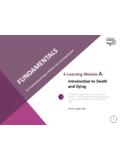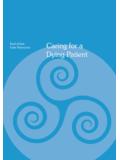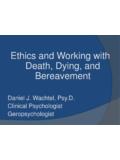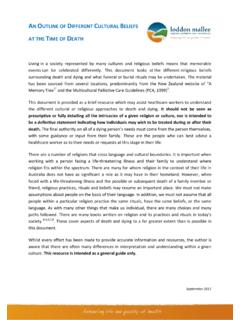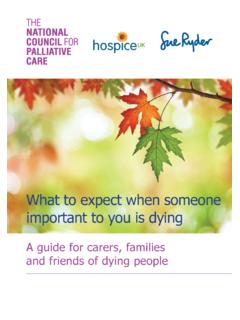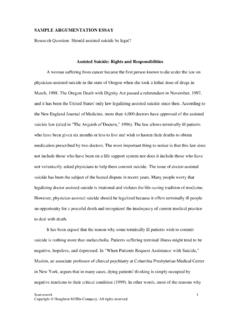Transcription of The New Yorker - Jerome Groopman – Author, …
1 The New Yorker October 28, 2002 ANNALS OF MEDICINE dying WORDS How should doctors deliver bad news? BY: Jerome Groopman Not long ago, I had an appointment with a patient who was likely to die within a year and a half. Maxine Barlow was a twenty-eight-year-old teacher in Boston. The only child of a middle-class family, she had recently become engaged to a financial analyst, Peter Wayland (all names have been changed). One morning in the shower, Maxine found a small lump in her breast, a little larger than a pea. A biopsy showed that it was breast cancer. Further tests revealed that the cancer had spread to Maxine s spine and liver, which meant that surgery could not fully remove it, and Maxine s surgeon referred her to me for chemotherapy.
2 Maxine and I met on a brisk autumn afternoon. Her appointment was my last of the day, since our conversation was likely to extend beyond the hour usually allotted to new patients. I had to explain the gravity of her condition and the possible choices she could make. After I had examined Maxine, we were joined in my office by her parents and by Peter. They sat in a semicircle facing me, with Maxine between them. I moved my chair out from behind my desk. Let s review what was found at surgery, I began. Maxine reached for Peter s hand. Although I addressed Maxine, I also briefly met the gaze of her parents and of Peter, in order to engage everyone.
3 The cancer in the breast measured one and a half centimeters, about half an inch, and under the microscope the cancer cells were actively dividing, I said. They should be treated aggressively. The tests we did on the tumor showed that it is not sensitive to hormones --which ruled out Tamoxifen, a common hormone-blocker. The scan showed that several deposits of tumor had spread from the breast to the bones in the neck. There also are four deposits in the liver. We can treat them with chemotherapy, which destroys the cancer cells wherever they might be lurking. The good news is that you stand a very strong chance of going into remission. So that means that she ll be Maxine s mother asked.
4 My stomach tightened in a familiar way. This part never got any easier. Remission does not mean cure, I said. Remission means that all the cancer we can measure disappears. Therapy is palliative. The New Yorker (October 28, 2002) dying Words (By: Jerome Groopman ) 1 What do you mean, palliative ? Peter asked in a panicked voice. She has to be cured, Maxine s father said. This distinction was important, and I needed to make sure, gently but unequivocally, that they understood. There is a very good chance that we will see the metastatic deposits in your bones and liver shrink significantly, or completely melt away. But the most intensive chemotherapy or radiation available -- even bone-marrow transplant -- is not enough to destroy every cancer cell in your body.
5 That is why, currently, we cannot say the cancer can be cured. Maxine sat without speaking. Her eyes filled with tears, and I gave her some tissues. What is the point of treatment, then? I asked. Palliation. That means that even if the cancer cannot be cured it can be controlled. The best-case scenario is that the cancer becomes like a parasite, I said, purposefully invoking a stark image. We knock it down with the therapy, and hope that it stays down for many, many months or years. You can live an active life -- work, jog, travel, whatever. The bones and liver can heal. And when the cancer returns we work to knock it down again. All the while, we hold on to the hope that an experimental treatment will be found that is able to eradicate the cancer -- to truly cure you.
6 Like Maxine, Mrs. Barlow was fighting back tears. Her husband stared at me. I paused before broaching a second critical issue. We talked about the best-case scenario. But we also have to acknowledge that there is a worst-case scenario. I had found that this part of the discussion was best completed rapidly, as if removing an adhesive bandage. The worst-case scenario is that ultimately the cancer becomes resistant to all the treatments we have, and even experimental therapies are no use. Most people say that if they reach a point in the illness when their brain is impaired, and there is no likelihood of improving their quality of life, then nothing should be done to keep them artificially alive, through machines like respirators.
7 It s essential, Maxine, that I know what you want done if we reach that point. I -- I don t think I would want that, she said, haltingly. You mean that you would want only comfort measures to alleviate pain, and nothing done to prolong your life, like a respirator or cardiac resuscitation? Yes, I think so, Maxine whispered. I nodded. This was her end-of-life directive. I would put it in writing in her medical chart. The New Yorker (October 28, 2002) dying Words (By: Jerome Groopman ) 2 We have a plan of therapy and an understanding. Now let s look on the positive side, I said, trying to spark some of the determination she would need in order to endure the months of chemotherapy ahead.
8 You are young, your organ function is excellent -- despite the deposits of tumor, your liver is still working well, and your blood counts are fine -- so there is every reason to think that you will tolerate the drugs and we will make real progress. I smiled confidently. Maxine struggled to do the same. But what are the exact odds for a remission? Peter Wayland asked. I mean, how many patients like Maxie stay in remission and for how long, on average? Maxine looked at him sharply. Dr. Groopman said that there is every reason to think I ll go into remission, she said. What more do we need to know now? She turned to me, her face full of uncertainty.
9 This was a crucial moment in our interview. There were several ways that I could answer Peter s question. I could give the bald statistics -- that more than fifty per cent of people with cancer like Maxine s die within two years -- or I could put it more gently, and say that she had a chance, if a low one, of surviving for more than two years. I could even say, somewhat vaguely, that she was young and strong and had as good a chance as anyone of surviving, on the principle that she would benefit more from encouragement than from statistics. As I looked at Maxine, I sensed that she preferred neither the extreme of ignorance nor the extreme of excruciating detail but some middle ground.
10 Statistics don t say anything about any particular individual, only about groups, I said. There can be wide variability in the behavior of any cancer in each person, because each of us is different -- different genetically, living in a different environment -- and we metabolize the treatments differently. I want my patients to be informed, I said, looking now at Peter. When Maxine said she understood there is a very good chance of remission, that is accurate. It could last months or it could last years. Putting precise numbers on it at this point doesn t really tell us anything more about Maxine. In the meantime, we need to plan for the best while acknowledging the worst.

